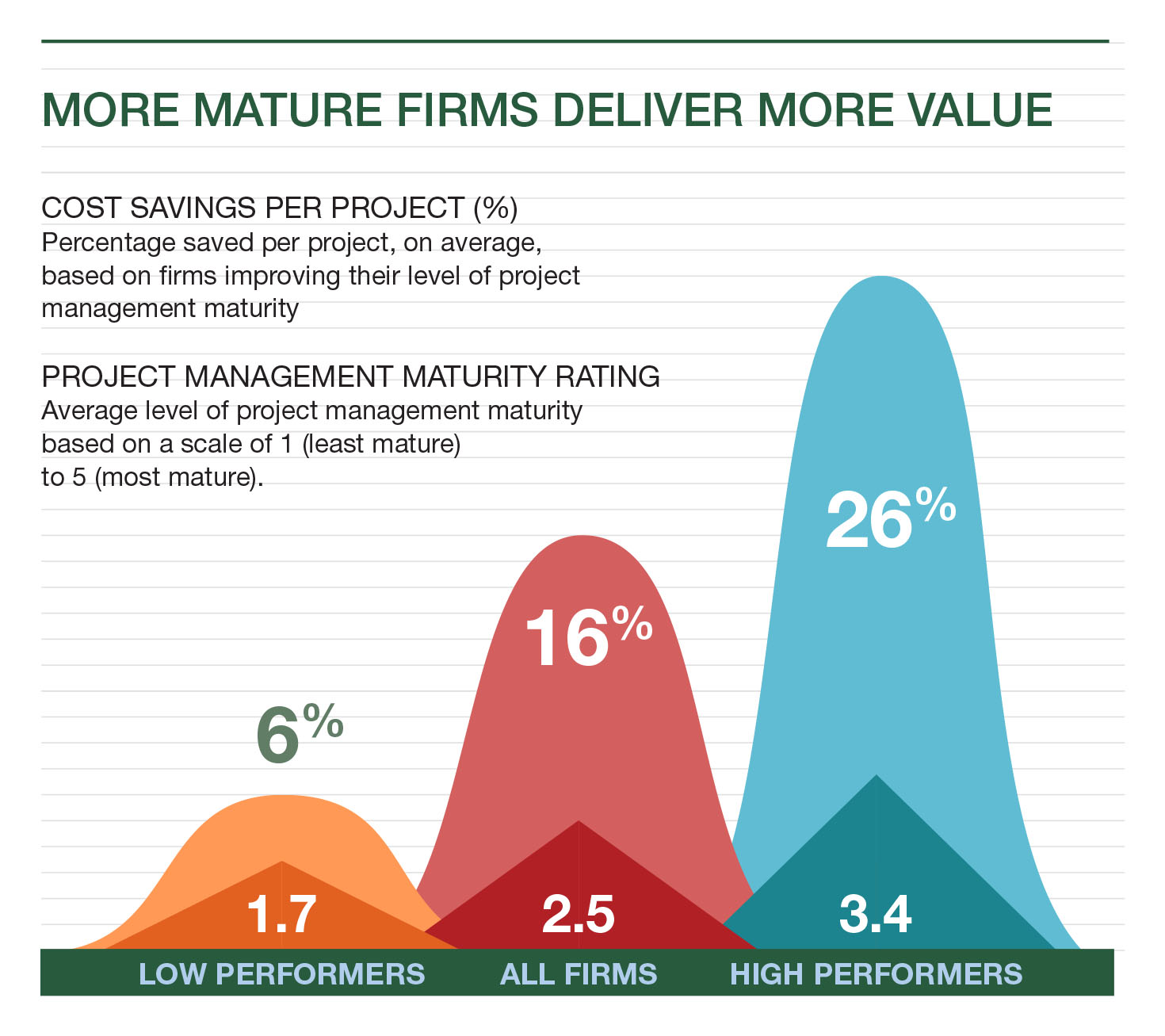Improving Project Management Yields Business Benefits ... And We Can Prove It
Our studies tell you not only what companies are doing, but whether it provides business value.
Just released today, the 2014 Project Management Maturity and Value Benchmark study reprises one of PM Solutions' most oft-cited research surveys, this time after a gap of several years. The findings will be exciting -- though not unexpected -- to proponents of project management.
First, let me just toot PM Solutions Research's horn about a feature of our studies that is somewhat unique. Instead of merely asking the responding companies to rate themselves on the Likert scale (1-5) to come up with a score, we also ask a battery of eight questions designed to assess whether or not the overall organization (not merely the PMO or other project management function) is doing well. The results against these eight measures of organizational performance, when correlated against the practices and outcomes reported by the survey participants, allow us to sort the respondents into two categories: those who work within "high-performing organizations" (the top 25% by score) and those who work within "low performers" (the bottom 25%). This not only tells us -- and you, the consumer of our research -- what companies are doing, but whether it is providing value to the business.
Kaching! 
That said, the results of the 2014 PMMM study pack a powerful punch:
High performers show substantially greater value from increasing their level of project management maturity. The improvements include:
- 38% decrease in failed projects
- 26% cost savings per project
- 32% improvement in number of projects delivered under budge
- 34% productivity gain
- 36% reduction in time to market
- 40% improvement in customer satisfaction.
High performers have also shown $125K cost savings per project vs. $8K for low performers. (See figure.)
For anyone who has asked themselves whether or not it would be worth the investment to improve project management processes, structure, or competency, this report provides some solid evidence.
Feel free to address questions about the study to me on this blog. If I can't answer them, I'll pull in one of our resident experts to enlighten you.
- Understanding PMaaS-Part 2
- When You Needed Results Yesterday: Understanding the Role of Project Management as a Service (PMaaS)
- PMaaS and Organizational Performance, Then and Now
- (More) Changing Approaches to Project Management
- What We Mean When We Say PM as a Service
- A Festively Decorated Big Box of …. What Now?!
- Jazzed Up About Project Management and AI
- Live from Atlanta ... People, Ideas and More, Part 2
- Live from Atlanta ... People, Ideas and More
- Value Delivery Skills Webinar Attendees Had Questions: Here Are Some Answers
- Webinar Alert: Project Management Skills for Value Delivery Research Overview
- Seven Actions for the Adaptive Organization
- PMO Staff vs PMO Leaders: Realism or Pessimism?
- High Performers Value These Skills
- PM Skills Benchmark Study: Your Second Chance to Participate
- New Research Launch: Project Management Skills for Value Delivery
- Managing Projects…Or Delivering Value? Eric Foss’s Challenge to Project Managers
- A Look Forward, With Hope and Confidence
- Some Thoughts About Governance, PMOs and the Thinking Project Manager
- PMO of the Year Finalist Ontario Power Generation
- The Future is Already Here for These PMOs
- State of the PMO Research Webinar – Your Questions, Answered: Part 2
- State of the PMO Research Webinar – Your Questions, Answered: Part 1
- Will A.I. Kill the PMO? Part 3 in Our A.I. in PM Series
- PMO Research Reveal: What You'll Learn in This Week's Webinar
- The Evolution of the Enterprise PMO: What Comes Next?
- Think Your Business Is Too Small for a PMO? Think Again.
- The Enterprise PMO Delivers
- PMOs: New Research Shows Benefits Outweigh Cost
- The PMO at 20: New Research Findings Released
Related Posts:
Tags:
(6 votes. Average: 2.5 out of 5)
Popular Posts
- The Project Management Maturity Model … Now with Agile/Adaptive Assessment!
- PM Solutions Celebrates 25 Years of Project Management Excellence
- Managing Project Managers Within and Outside the PMO
Popular Categories
- Agile or Adaptive PM (5)
- Culture & Change Management (75)
- Project & Program Management (82)
- Portfolio Management (50)
- Project Management Office (PMO) (107)
- Project Management Research (50)
- Resource Optimization (26)
search blog:
Sign up for PM Solutions'
Insights eNewsletter
Delivered every other month in addition to periodic research, white papers, and news alerts.




No comments yet. Be the first one!